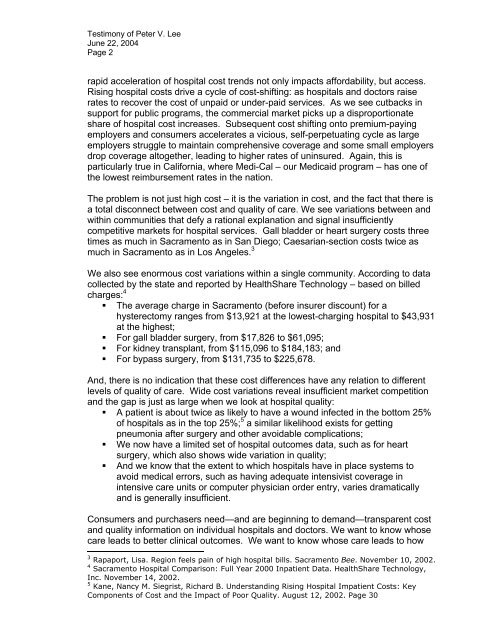PBGH President & CEO Peter V. Lee Testimony before - Consumer ...
PBGH President & CEO Peter V. Lee Testimony before - Consumer ...
PBGH President & CEO Peter V. Lee Testimony before - Consumer ...
- No tags were found...
Create successful ePaper yourself
Turn your PDF publications into a flip-book with our unique Google optimized e-Paper software.
<strong>Testimony</strong> of <strong>Peter</strong> V. <strong>Lee</strong>June 22, 2004Page 2rapid acceleration of hospital cost trends not only impacts affordability, but access.Rising hospital costs drive a cycle of cost-shifting: as hospitals and doctors raiserates to recover the cost of unpaid or under-paid services. As we see cutbacks insupport for public programs, the commercial market picks up a disproportionateshare of hospital cost increases. Subsequent cost shifting onto premium-payingemployers and consumers accelerates a vicious, self-perpetuating cycle as largeemployers struggle to maintain comprehensive coverage and some small employersdrop coverage altogether, leading to higher rates of uninsured. Again, this isparticularly true in California, where Medi-Cal – our Medicaid program – has one ofthe lowest reimbursement rates in the nation.The problem is not just high cost – it is the variation in cost, and the fact that there isa total disconnect between cost and quality of care. We see variations between andwithin communities that defy a rational explanation and signal insufficientlycompetitive markets for hospital services. Gall bladder or heart surgery costs threetimes as much in Sacramento as in San Diego; Caesarian-section costs twice asmuch in Sacramento as in Los Angeles. 3We also see enormous cost variations within a single community. According to datacollected by the state and reported by HealthShare Technology – based on billedcharges: 4• The average charge in Sacramento (<strong>before</strong> insurer discount) for ahysterectomy ranges from $13,921 at the lowest-charging hospital to $43,931at the highest;• For gall bladder surgery, from $17,826 to $61,095;• For kidney transplant, from $115,096 to $184,183; and• For bypass surgery, from $131,735 to $225,678.And, there is no indication that these cost differences have any relation to differentlevels of quality of care. Wide cost variations reveal insufficient market competitionand the gap is just as large when we look at hospital quality:• A patient is about twice as likely to have a wound infected in the bottom 25%of hospitals as in the top 25%; 5 a similar likelihood exists for gettingpneumonia after surgery and other avoidable complications;• We now have a limited set of hospital outcomes data, such as for heartsurgery, which also shows wide variation in quality;• And we know that the extent to which hospitals have in place systems toavoid medical errors, such as having adequate intensivist coverage inintensive care units or computer physician order entry, varies dramaticallyand is generally insufficient.<strong>Consumer</strong>s and purchasers need—and are beginning to demand—transparent costand quality information on individual hospitals and doctors. We want to know whosecare leads to better clinical outcomes. We want to know whose care leads to how3 Rapaport, Lisa. Region feels pain of high hospital bills. Sacramento Bee. November 10, 2002.4 Sacramento Hospital Comparison: Full Year 2000 Inpatient Data. HealthShare Technology,Inc. November 14, 2002.5 Kane, Nancy M. Siegrist, Richard B. Understanding Rising Hospital Impatient Costs: KeyComponents of Cost and the Impact of Poor Quality. August 12, 2002. Page 30




